Remembering Munir Muhammad
By Starla Muhammad -Managing Editor- | Last updated: Jul 18, 2019 - 5:30:29 PMWhat's your opinion on this article?

Munir Muhammad, co-founder and business manager of the Coalition for the Remembrance of the Honorable Elijah Muhammad (CROE), host of the Munir Muhammad Show and Muhammad and Friends.
|
CHICAGO—Black Chicago, the Muslim community and independent media lost a bright and unique star with the unexpected and sudden death of Munir Muhammad. Mr. Muhammad, cofounder and business manager of the Coalition for the Remembrance of the Honorable Elijah Muhammad (CROE), host of the Munir Muhammad Show and Muhammad and Friends passed away July 9 leaving a heaviness in the hearts of those that admired him and whose lives he touched. Yet, he left behind a major legacy and work they vow to continue. He was 69 years old.
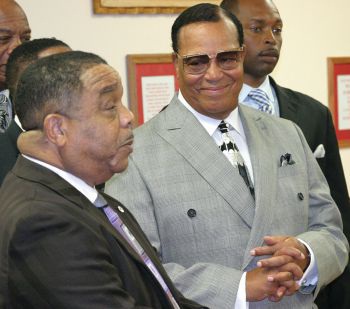
Munir Muhammad with the Honorable Minister Louis Farrakhan.
|
It was his dedication to preserving the legacy of the Nation of Islam patriarch that fueled his work and enabled him to forge and cultivate community relationships and bonds that crossed political and religious lines.
“I considered him a friend and I’m grateful for his support,” said Cook County Board President Toni Preckwinkle. The former Chicago alderman, mayoral candidate and political powerbroker appeared on CROE programming with Munir Muhammad many times over the years.
“With his television programming he served a vital function of informing our community around critical issues. I know he was always encouraging me not only to be on his programs but to bring my bureau chiefs and department heads and the heads of sister agencies to inform as well and give them a chance to share what they were doing with the public and I’m grateful for that. We can’t have an informed democracy without an informed citizenry, and he was an important contributor to that,” she told The Final Call.
“I got to meet him in many different forums, and he was always at a variety of community events. Not only did he try to inform people through his programming, but he also tried to be physically present at a lot of important events in our community. He had a great sense of humor; he was always well informed. Whenever you came on his program he’s abreast of the latest issues and always had thoughtful questions to ask. He was a good interviewer.” Munir Muhammad conducted thousands of interviews over the years including with a Chicago community organizer who eventually became president of the United States, Barack Obama.
In a statement, Rev. Jesse Jackson Sr. called Munir Muhammad “a huge source for social justice and community connectivity.”
“His television show became a conduit for information. He was a frame of reference for our community. His death leaves a vacuum. We thank him for his service. We miss him very much already and offer our deepest condolences to his family,” said Rev. Jackson.
No matter where he was or who was in the room, Munir Muhammad always made it clear who and what he represented: the Honorable Elijah Muhammad. He interviewed his friend and companion Nation of Islam Minister Louis Farrakhan numerous times over the air waves.
During CROE’s recent anniversary celebration held March 4 which drew a packed house, Min. Farrakhan expressed his love and appreciation for his work and a noble institution.
“First, let me say how much I thank Allah for you, Brother Munir Muhammad, for your family, and for all those at CROE who have helped you over these last 32 years,” said Min. Farrakhan. “So, long live CROE and long live Brother Munir Muhammad for the great service you have offered not only to those of us who know you but the future generations who will come up and want to know about the man that walked among us, the first born of God to be made from a dead level and produced as a God,” said Min. Farrakhan.
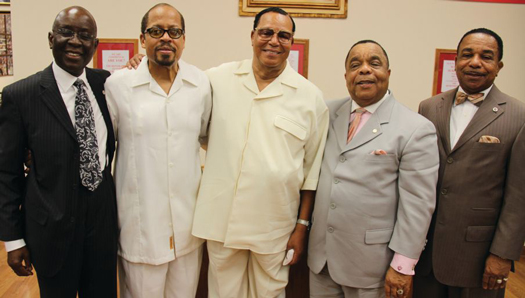
From left: Shahid Muslim, co-founder of CROE; Rasul Muhammad, son of the Honorable Elijah Muhammad; Minister Louis Farrakhan; Munir Muhammad, co-founder of CROE and Halif Muhammad, co-founder of CROE.
|
Institution builder and unapologetically Elijah
In the autumn of 1986 armed with few resources, but filled with a desire to preserve, document and share the history and legacy of the Honorable Elijah Muhammad, Munir Muhammad, his brother Halif Muhammad, Shahid Muslim, and a small group of people— launched CROE.
Born and raised in Birmingham, Ala. Muhammad eventually followed his two older brothers north to Chicago. It was there that barely in his 20s, Munir and Halif, older by four years first heard the teachings of the Honorable Elijah Muhammad in 1972. Both began the process of receiving their “X” and later Munir became an assistant to Min. Farrakhan on Chicago’s West Side.
When Min. Farrakhan began rebuilding the Nation of Islam in the late 1970s and early 80s after the departure of the Honorable Elijah Muhammad, Munir Muhammad appreciated and respected those efforts. He also wanted to help in lifting up the name of the man who produced Malcolm X, Muhammad Ali, Imam Warith Deen Mohammed and countless others but in a different way. What began as humble group meeting and listening to cassette tapes of messages by the Honorable Elijah Muhammad at weekly gatherings blossomed to what today is an independent educational, cultural and media institution on the city’s Southwest side that broadcasts weekly television shows filmed, produced and aired from its onsite studio.
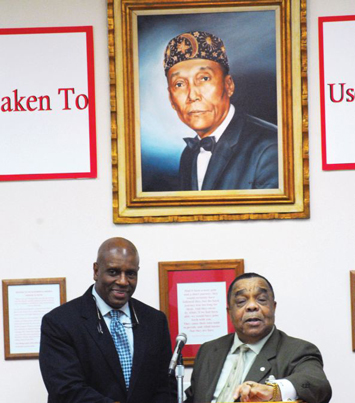
Dr. Tyrone Powers and Munir Muhammad at CROE Founder’s Day Celebration on March 4, 2018.
|
CROE houses a television studio and extensive collections of historical photos of the Honorable Elijah Muhammad, Minister Louis Farrakhan, Nation of Islam pioneers, memorabilia and issues of the iconic Muhammad Speaks newspaper. The organization serves as the archives for the Nation of Islam. Munir Muhammad served as the organization’s business manager, Halif Muhammad as secretary and Shahid Muslim as director.
In 1992 CROE held its grand opening where Min. Farrakhan delivered the keynote address and the group also began broadcasting its popular Muhammad and Friends television show. Munir Muhammad never hesitated to ask guests critical and pointed questions and welcomed all who had something he thought was valuable or critical to share with the community.
Dr. Tyrone Powers, author of Eyes to My Soul: The Rise or Decline of a Black FBI Agent, met Munir Muhammad over 20 years ago and the two immediately “hit it off.”
“He immediately began to talk about the Honorable Elijah Muhammad and the Honorable Minister Louis Farrakhan, their work, their methods and their philosophies,” explained Dr. Powers. In turn, Dr. Powers said he talked to Munir Muhammad about the workings of the FBI and the methods and tactics the agency often deployed against Black people.
“We had great conversations and great exchanges of information. I learned so much and then he gave me the Messenger’s books to read and he said, ‘I’m not trying to get you to convert or to become a part of the Nation. I just want you to read this and make it a part of whatever you do as an educator, lecturer, as a writer and as a professor,’ ” said Dr. Powers.
“He said, ‘I just don’t believe I have to convince you of anything, I believe that if you read this material that it will become a part of everything you do’ and he was absolutely right. So anytime I spoke across the nation on the FBI, their methods and what I experienced in the agency and how they worked, I was able to integrate and see how it applied to what the Messenger was teaching, what Min. Farrakhan was teaching and we just developed a remarkable relationship,” said Dr. Powers. Munir Muhammad served a father figure, brother and friend and would call and check on him as he battled cancer, said Dr. Powers. “He would call me just to check on my well-being,” he said.
“From the beginning he loved the Honorable Elijah Muhammad and everything he stood for,” author and historian Abdul Akbar Muhammad told The Final Call. “Years later when it seemed most people had forgotten his work, Munir wanted it remembered so he started CROE. It was his way of making sure that the work of the Honorable Elijah Muhammad stayed relevant in the minds of the people but also showed the versatility of his work. Munir was committed and dedicated to his show. He loved the Honorable Elijah Muhammad and wanted others to love him too.”
In a previous Final Call interview Munir Muhammad said his love for Min. Farrakhan started from the time he first met him in the early 1970s and had grown, despite their friendship and brotherhood enduring a few years of misunderstandings and disagreements.
“I can recall going out to Phoenix and we made this pledge that never again will we be separated no matter what. And that’s something that I feel true to because I know that it has benefited me, but it has benefited other people,” he explained in the 2016 interview.
“And when we live long enough for whatever misunderstanding that we may have had that—that reconciliation was able to come together before either one of us departed; that’s what I’m happiest about. I cherish those moments every day and it’s special for me.”
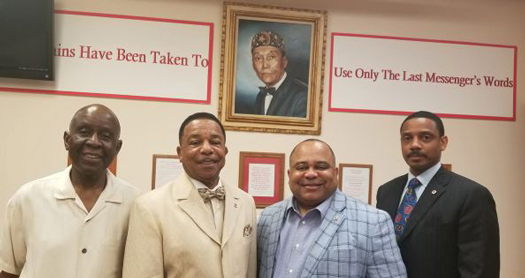
From left: Shahid Muslim, Halif Muhammad, Jamil Muhammad and Mandene Muhammad.
|
For Ali Baghdadi, a Palestinian activist and writer, the death of Munir Muhammad was the loss of his best friend. Mr. Baghdadi told The Final Call, “We were supposed to go to a restaurant when I got home from the hospital. I was supposed to call him. This guy was so committed to the program and principles of the Honorable Elijah Muhammad. He loved him so much and the principles he stood for. He didn’t fear anyone either,” said Mr. Baghdadi.
“I appeared on his show many times. He told me to say anything and don’t fear anyone. He’s really my brother. I spent many days with him at Min. Farrakhan’s farm. I had whole days with him carrying on long conversations at the farm. Munir will continue to be my brother but now I am without a brother.”
Vocalist and movie and television actress Cynda Williams, best known for her role in the Spike Lee film, “Mo’ Better Blues,” also called Munir Muhammad a father figure and friend. The Chicago native was first introduced to him several years ago at a fundraiser held at a church where she was performing. They ended up talking for over an hour. “It was just like an interview. We talked for quite some time and at that point he invited me to come to be on his show and that was the beginning of a very, very good friendship,” said Ms. Williams. “I’m not honestly really great at communication even with my friends because I get caught up in my own life … and there aren’t many people that I keep in touch with on a consistent basis, but he made that simple for me because he kept in touch with me. He always checked in, he always made sure my daughter was well … he made friends with my ex and they were very tight. And he just made sure that we were OK. I really always appreciated that consistency with him.”
Just a few days before his death, Ms. Williams said she was driving from Indiana and they talked. “He sounded great and we caught up and talked for about 20 minutes with the same plans of ‘well when you come in and get settled, come in on the show,’ ” she said.
Actor Harry Lennix who has starred in such films as, “The Five Heartbeats,” “Love and Basketball,” first met Munir Muhammad in the early 2000s and the two men became friends and admired one another’s work. Mr. Lennix admired Mr. Muhammad’s tenacity and his ability to talk to anyone.
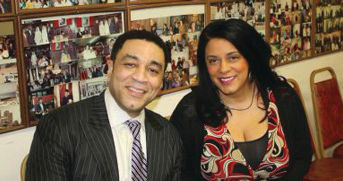
Actors Harry Lennix and Cynda Williams
|
“We’re family and it would be inconceivable to think of Chicago without him and to actually think of life without Brother Munir. I never thought that he would stop and he won’t. He has left a legacy of thousands upon thousands hours of dedicated service to community, dedicated commitment to the message of the Honorable Elijah Muhammad and the benefit that I personally got from that is immeasurable because of what I learned through him and CROE.”
It was the important role as a family man and friend that also meant so much to Munir Muhammad. He viewed his biological family and CROE family as one in the same. Whether filming in CROE’s studio or attending an event in the community, Mandene Muhammad was usually right there with his mentor and friend. Mandene Muhammad first came to CROE as a 17-year-old because he was curious about Islam. Munir Muhammad always wanted to get young people involved in CROE and training and cultivating young minds was important to him, explained Mandene Muhammad. “He’s always getting young people involved; picking their brains, seeing if we’re actually doing some thinking, getting us working. He’s always thinking about the future, replacements.”
Munir and Halif Muhammad’s oldest brother Lee used to do the camera work. “Somehow, I started doing the camera work, I can’t tell you when … no type of training or anything,” Mandene Muhammad said as he laughed. That was in the early 1990s. Munir and CROE invested in him and brought him on trips to various parts of the country and even international trips. “I started traveling with them and that’s how I learned,” he said. Now, 46, Mandene Muhammad is now program director for the various television programs at CROE.
“I think what he saw in me was just a sense of loyalty and commitment. What I saw in him was just that; a commitment to a man (the Honorable Elijah Muhammad) that I had never met. But this man had a love for people that I probably would have never seen; and so for a man to be committed to a man that he’d never met like that it’s an honor to do this labor. Not being able to see the Messenger, the next best thing being near to Min. Farrakhan or being near a brother like Brother Munir and doing this work and just being places and meeting people who I would’ve never even thought about going to meeting, it’s an honor. I’ll never be ungrateful for those memories.”
Munir Muhammad is survived by his wife Aminah Muhammad and three children: Carlos Muhammad, Jamil Muhammad and daughter Aginah Muhammad.
“As a dad he was the only one I ever completely really trusted not to hurt me. I was just looking at one of the pictures that we had and he was always teaching me,” said Jamil Muhammad. As a youngster, his father used to take him to school every day. “We would talk on the way to school and always (about) life’s lessons. I used to go with my father on Saturday’s where he would be selling fish or suits and we would just spend a lot of time together,” he said. His father instilled confidence in him said Jamil Muhammad. His father was a disciplinarian and taught his children about accountability, he added. “He would prefer that I explained why I did things. ‘I don’t know’ was not a good answer.”
Halif Muhammad never imagined his little brother would die before him. He was the youngest of six children. They resemble each other so much that people often mistook Halif for Munir. They were always close and spoke daily. “We were raised like that. We came into the Nation (of Islam) together. We acted a fool and ran the streets together. That’s all I know and it’s natural that I would miss him,” he said.
“I remember when Munir first tried to walk. He had this big head. He stood up one day. I petted him like he was a toy or something,” Halif Muhammad fondly recalled.
Their father expected him to teach his little brother what he was taught. “My duty, my responsibility was to whatever I got, whatever level he taught me, I would have to teach it to Munir. And then that little boy grew up and taught me a thing or two!”
A legacy and mission continue
When news broke of Munir Muhammad’s passing, for some, it would have been understandable if Muhammad and Friends did not air a live show on its usual day and time. The show was scheduled to air July 10, the day after his death. Yet like clockwork, the familiar theme song played and the show went on. Jamil Muhammad sat in his father’s familiar seat as Shahid Muslim and Halif Muhammad reflected on the life, legacy and contribution of their father, friend, brother and comrade with Mandene Muhammad directing the action behind the scenes. It is what Munir Muhammad would have wanted and what he would have demanded.
“We ain’t going to stop,” said Shahid Muslim. He joined the Nation of Islam in 1968 at 27 and is now 77. “Everything must keep going because we’ve got the blueprint; the blueprint of the Honorable Elijah Muhammad. We just keep moving. All we do is just everybody’s got to just step up a little bit more to take the position that he was taking. We all just going to do a little more then what we were doing. But we’re not going to stop.”
Halif Muhammad agreed. Though his brother was inspirational and encouraging, the foundation of CROE is the commitment to the Honorable Elijah Muhammad, he explained. “We’re going to do this until we die, like him and now even more so because we feel indebted that he sacrificed his life,” said Halif Muhammad.
“He was a great man, a great brother.”
(Nisa Islam Muhammad and Final Call staff contributed to this report.)
INSIDE STORIES AND REVIEWS
-
-
About Harriett ... and the Negro Hollywood Road Show
By Rabiah Muhammad, Guest Columnist » Full Story -
Skepticism greets Jay-Z, NFL talk of inspiring change
By Bryan 18X Crawford and Richard B. Muhammad The Final Call Newspaper @TheFinalCall » Full Story -
The painful problem of Black girls and suicide
By Charlene Muhammad -National Correspondent- » Full Story -
Exploitation of Innocence - Report: Perceptions, policies hurting Black girls
By Charlene Muhammad -National Correspondent- » Full Story -
Big Ballin: Big ideas fuel a father’s Big Baller Brand and brash business sense
By Bryan Crawford -Contributing Writer- » Full Story






 Click Here Stay Connected!
Click Here Stay Connected!








